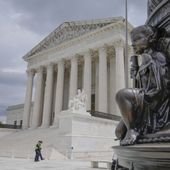Sen. Evan Bayh ended his White House bid yesterday while 2004 vice presidential nominee John Edwards finalized plans to get in — fast-paced jockeying in a Democratic race under the shadow of two unannounced candidates.
Mr. Bayh, Indiana Democrat, decided he could not compete with Sens. Hillary Rodham Clinton of New York and Barack Obama of Illinois, whose possible candidacies have dominated the positioning almost two years before the actual election.
Mr. Edwards, the former North Carolina senator, has decided he can compete and is planning to announce his campaign in New Orleans between Christmas and New Year’s, two Democrats said.
Mr. Edwards’ novel choice of sites shows how he wants to distinguish his candidacy: emphasizing policies he thinks can unite a country he says is divided by economic inequality, a situation no more evident than in the city’s Lower Ninth Ward, still recovering from Hurricane Katrina.
Mr. Bayh’s exit stunned rivals and supporters. The former Indiana governor abandoned his bid just two weeks after forming a committee to raise money and gauge support for his candidacy.
“The odds were always going to be very long for a relatively unknown candidate like myself, a little bit like David and Goliath,” Mr. Bayh said. He added that beyond the question of “whether there were too many Goliaths or whether I’m just not the right David,” his chances were slim.
Mr. Bayh did not say who he considered to be the Goliaths. Yet it is Mr. Obama and Mrs. Clinton who are attracting most of the attention among the 10 or more Democrats considering a bid.
Mr. Edwards, however, is in a strong position as the leading candidate in the first nominating state, Iowa. He has taken the lead in Iowa polling even with favorite son Gov. Tom Vilsack in the mix.
Democratic strategist Stephanie Cutter said Mrs. Clinton and Mr. Obama have emerged as the front-runners much earlier than was the case in previous campaigns. But she said another candidate could compete with them.
“There’s room for one more. The question is: Who is it right now? And I don’t think anybody can tell you with any real certainty of who that could be,” she said.
Mr. Edwards plans to give Iowa more attention with an announcement tour to begin around Dec. 28, the Democratic officials said. He plans to travel from New Orleans to Iowa and the three other early-voting states — Nevada, New Hampshire and South Carolina.
The officials who discussed Mr. Edwards’ plans spoke on the condition of anonymity because they did not want to pre-empt his announcement. Mr. Edwards’ spokesman, David Ginsberg, would not confirm or deny the former senator’s plans.
Mrs. Clinton and Mr. Obama would start in a strong position if they decide to run.
The former first lady, one of the most well-known women in America, has a vast network of supporters developed during President Clinton’s two terms.
Mr. Obama, who left yesterday on a two-week trip to visit family in Hawaii, has little experience in national politics. He has been in the Senate for only two years. But his message of hope is attracting support from Democrats who are looking for a fresh face and are concerned that Mrs. Clinton could not win the general election.
Mr. Bayh got a taste of the competition Mr. Obama poses when they were in New Hampshire last weekend. Mr. Bayh, who had worked for months to line up support in the state, spoke at small gatherings. Mr. Obama, on his first visit, drew thousands of activists and hordes of reporters at two packed events.
Mr. Bayh, 50, left open the possibility of another run. “There may be no campaign in the near future, but there is much work to be done,” the two-term senator said.
He had been one of the most well-positioned candidates in the money race, with more than $10 million already to put into his campaign. But he faced a challenge in continuing to build his war chest while other candidates soaked up all the national attention.
Insiders expect this campaign will be the most expensive in history, with candidates needing to raise tens of millions of dollars next year to remain viable.
“The hardest part for anybody is to figure out: How do I get $30 [million] to 40 million,” said Steve Elmendorf, a top adviser to Sen. John Kerry, Massachusetts Democrat, during his 2004 presidential bid. “It’s daunting for anybody. I think Mrs. Clinton and Obama can do it, but I have real questions if any one else can do it.”



Please read our comment policy before commenting.